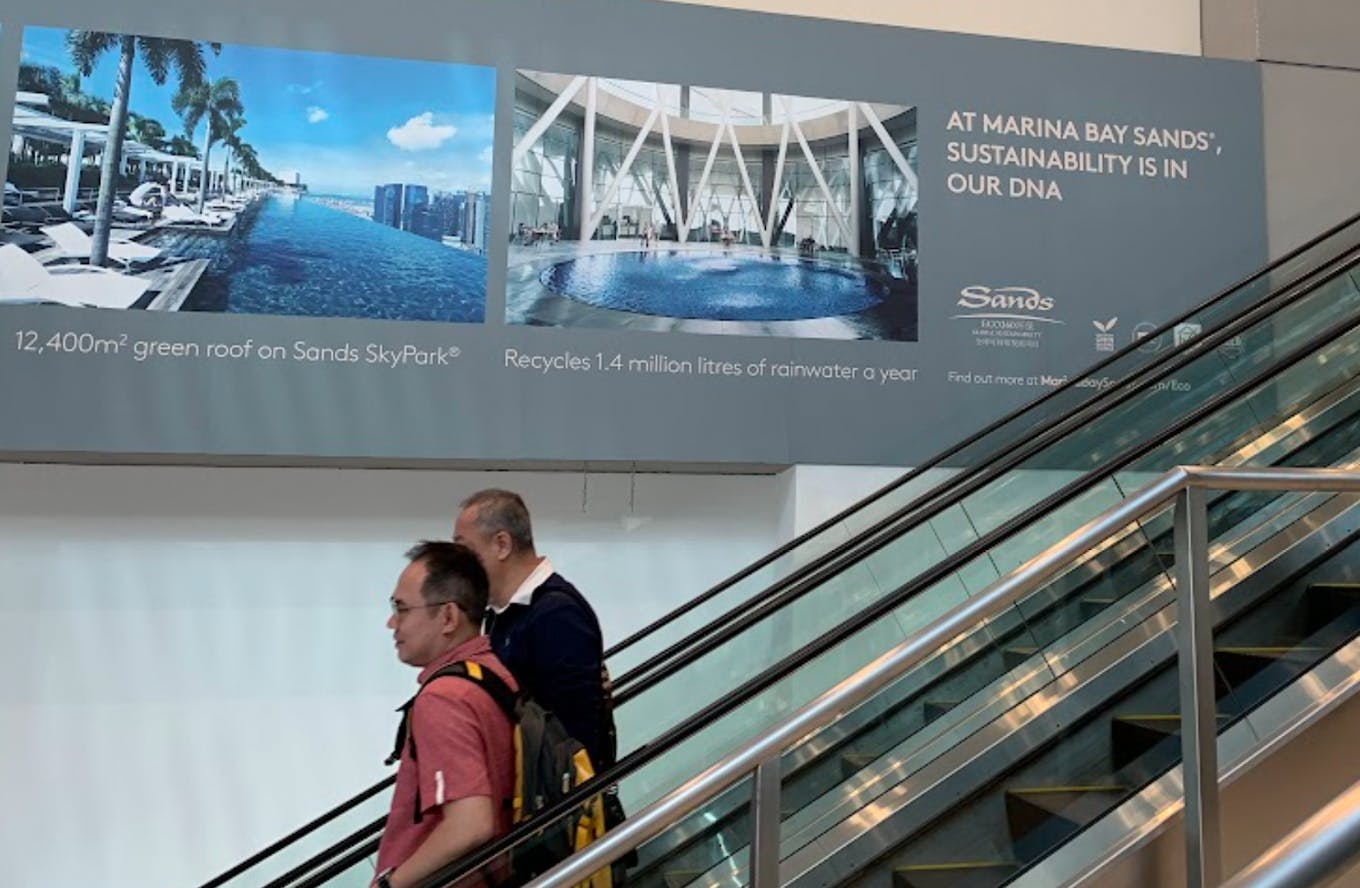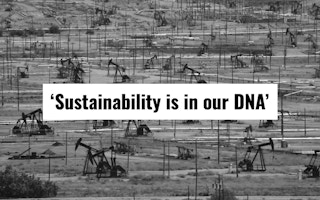What do the following brands have in common?
To continue reading, subscribe to Eco‑Business.
There's something for everyone. We offer a range of subscription plans.
- Access our stories and receive our Insights Weekly newsletter with the free EB Member plan.
- Unlock unlimited access to our content and archive with EB Circle.
- Publish your content with EB Premium.
HP. Fonterra. Canon. Temasek. Lombard Odier. Interface. Nissan. Allianz. Microsoft. Nestlé. DuPont. Bridgestone. Saab. Marina Bay Sands. Sinar Mas. Samsung. FrieslandCampina. Macquarie Asset Management. SAP. Ricoh. Etihad. Godrej. Greiner Packaging. Finnair. Epson. Clariant. Nespresso. Sydney Opera House. Sembcorp. Asian Agri. DeepOcean. ST Telemedia. TH Group. Pakistan Polymers.
They have all used almost exactly the same phrase to talk about how committed they are to sustainability.
“Sustainability is in our DNA.”
“Sustainability is at the heart of everything we do.”
“Sustainability is in our core.”
Suspiciously similar versions of the same trite slogan inundate press releases, CEO speeches, advertising campaigns, media interviews and sustainability reports the world over.
There are 53,900 Google search results for the term “sustainability is in our DNA”, 153,000 for “sustainability is at the heart of everything we do” and 74,700 for “sustainability is in our core”.
So the above list barely scratches the surface of the number of brands that try to convince us that sustainability is, and always has been, central to the way they do business.
A Singaporean supermarket chain was the latest brand to use the phrase (at least at the time of going to press – no doubt hundreds more have said it since) in a quote from the company’s newly installed chief sustainability officer. “Sustainability is at the core of our business,” he said.
If ever there was a phrase that was so obviously extracted from the bowels of the corporate communications department and inserted into the mouth of an unsuspecting executive, this is it.
The truth is, if sustainability actually was central to so many business philosophies, the planet would probably not be quite as warm as it is now.
A January study of sustainability professionals working for international companies with US$75 million in revenue or more found that, on average, firms spend just 4 per cent of their revenue on sustainability programmes.
Hyper-consumption, resource depletion and pollution are problems largely caused by Big Business. Slogans that suggest that reversing these problems are what businesses do all day do not hold water.
BP, the oil major famous for popularising the phrase “carbon footprint” to pass the buck for climate chaos on to consumers, claims on its website that it is “Putting sustainability at the heart of what we do” with a slew of targets, including reaching net-zero by 2050.
Careful not to claim that sustainability has always been at the heart of a business that put 300 Olympic-sized swimming pools of oil into the Gulf of Mexico and has a carbon footprint bigger than some countries, BP’s version of the phrase is less bold than most.
But it is still hard to swallow, and leaves the brand open to accusations of greenwash.
Even then, the phrase doesn’t really fall under any of the different definitions of greenwash recently described by Planet Tracker, because it is such a “vague non-statement,” says Lucy von Sturmer, founder of Creatives for Climate, a community group for creatives working on climate campaigns.

Marina Bay Sands, a casino and hotel complex in Singapore, has “Sustainability is in our DNA” emblazoned on the wall of its conference centre. Image: Robin Hicks/Eco-Business
Prove it
So why are so many brands hiding behind the same slogan when talking about a topic that is now under such intense scrutiny from investors, regulators and consumers?
“There is a perceived ‘safety in sameness’ – particularly when it comes to sustainability communications,” says Suzy Goulding, who leads sustainability for communications company Publicis Groupe in Asia. As long as brands say exactly the same as their peers, no-one will ask awkward questions, appears to be the reasoning, she suggests.
The fear of standing out is frustrating for communicators like Goulding, whose job involves highlighting the progress her clients are making in sustainability, and using that progress to help differentiate the brand and build its reputation.
Using hackneyed slogans like “sustainability is in our DNA” achieves the opposite of shielding a company from scrutiny, Goulding contends. “The first thing I would want to ask a client if this was their opening statement would be: prove it.”
Fossil fuels companies use the “DNA” mantra often, observes Belinda Noble, founder of Comms Declare, a non-profit pushing for public relations firms to stop working for Big Oil.
“For most companies it is meaningless, self-serving bullsh*t. Either, it is an aspiration from their executive team, or a blatant tactic from the marketing team to capitalise on green consumer sentiment,” she says.
Brands that have genuinely embedded sustainability into their businesses, like clothing brand Patagonia and confectioner Tony’s Chocolonely, can usually clearly articulate what their purpose is without a generic catch-all phrase, says Darian McBain, the former CSO of the Monetary Authority of Singapore and Thai Union, who recently started a consultancy.
She says businesses are feeling pressured to insert sustainability somewhere in the language they use, but don’t really understand how or why. “Sustainability is at the heart of our business” means little, isn’t measurable but keeps you firmly in the pack to meet generic stakeholder expectations,” says McBain.
For some businesses, a more appropriate phrase would be “sustainability is the appendix of our business”, McBain suggests: “No real purpose, can be removed surgically without significant interruption to longevity, but has significant implications if it bursts.”
With growing pressure on brands to prove that their sustainability claims are real, with serious legal consequences for those that aren’t – just ask Shell, Danone, H&M, Deutsche Bank and others – loose, generalised claims now feel perilously out of date.
Views expressed are solely the author’s.


















